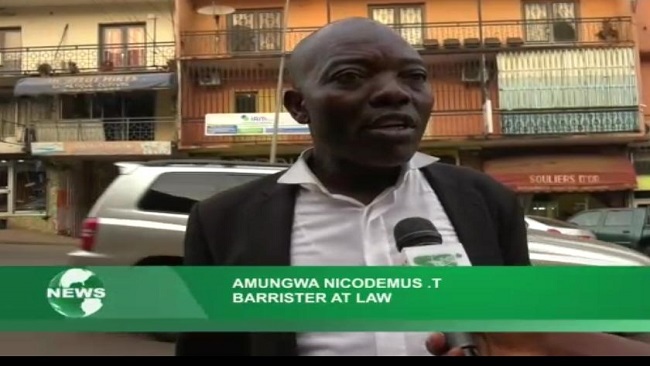Southern Cameroons Crisis: Human Rights Lawyer Detained on Bogus Terrorism Charges
Today marks one week since prominent Cameroonian human rights lawyer, Amungwa Tanyi Nicodemus, was thrown behind bars on bogus charges of inciting terrorism. He should be released immediately.
Gendarmes arrested Amungwa on May 31 at the Groupement Territorial de la Gendarmerie in Cameroon’s capital, Yaoundé, while he was assisting a client. According to Amungwa’s lawyers, after Amungwa complained that Cameroon’s criminal procedure had been breached in his client’s case, the gendarme in charge of the investigation seized Amungwa’s phone without a warrant, claiming Amungwa had taken photographs at the facility. While searching for the alleged photographs, the gendarme found other photographs that recorded alleged military abuses in Cameroon’s Anglophone regions and arrested Amungwa, his lawyers said.
Amungwa was transferred to the Service Central des Recherches Judiciaires (SCRJ), at the State Defense Secretariat (Secrétariat d’État à la défense, SED) – a detention facility where Human Rights Watch has previously documented repeated resort to incommunicado detention and torture – where he remains detained.
On June 1, Amungwa’s lawyers and the head of the Cameroon bar association visited him in detention and urged his release. Two days later, the Yaoundé military court prosecutor rejected Amungwa’s lawyers’ request for bail and returned the case to the SCRJ for “relevant checks.”
Amungwa, a member of the Cameroon bar association, is one of the lawyers representing Sisiku Julius Ayuk Tabe, the jailed leader of the Cameroonian separatist group, the Ambazonia Interim Government, and several other people arrested in connection with the Anglophone crisis.
“Amungwa’s arrest is a direct attack on the legal profession,” Ayukotang Ndep Nkongho, one of Amungwa’s lawyers, told me. “His arbitrary detention reveals a system geared towards stifling and undermining the role and activities of lawyers involved in key human rights cases.”
Amungwa’s detention takes place amidst a broader crackdown in Cameroon on opposition and dissent. He is one of dozens of government critics, human rights defenders, and journalists arrested in recent years.
Possessing photographs that provide evidence of abuses in the English-speaking regions is not a crime, far less an act to incite terrorism. Cameroonian authorities should immediately release Amungwa and ensure both his due process rights and his role and privileges as a lawyer are respected.
Source: Human Rights Watch





